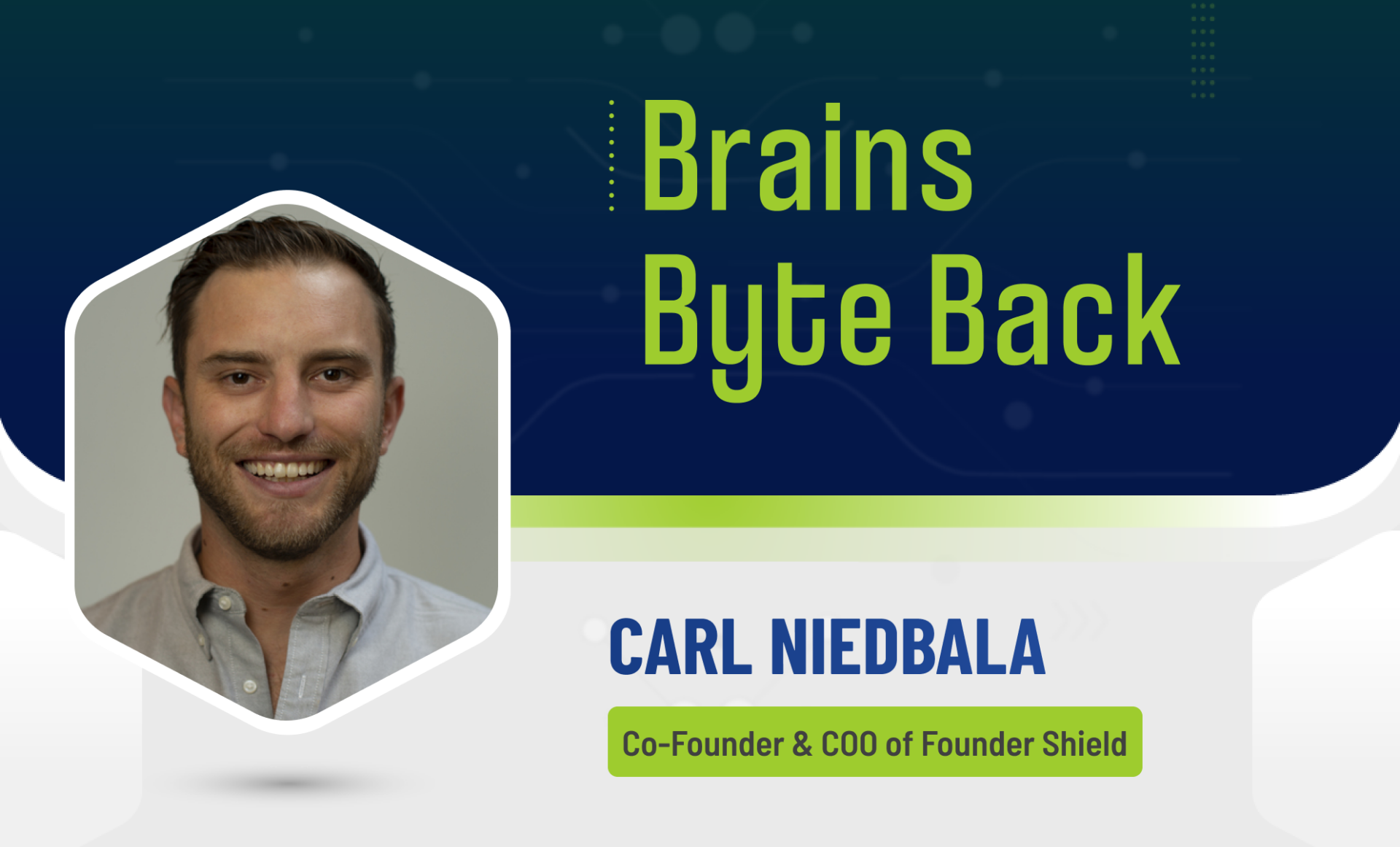In today’s episode of the Brains Byte Back podcast, we are joined by Carl Niedbala, Co-Founder & COO of Founder Shield, a risk management partner for rapidly evolving, high-growth companies. Under the umbrella of Founder Shield, the company owns the cannabis insurance business Alpha Root.
On the show, we discuss the inspiration that led to the creation of both these companies, Alpha Root’s new podcast Roots to Risk, and some of the biggest challenges when it comes to operating an insurance business in the cannabis space.
You can listen to the episode below, or on Spotify, Anchor, Apple Podcasts, Breaker, Google Podcasts, Stitcher, Overcast, Listen Notes, PodBean, and Radio Public.
Alternatively, you can find a transcript below:
Carl: So thanks for having me. I’m Carl Niedbala. I am the co-founder and CEO at Founder Shield. And our family of companies includes Alpha Root and a company called Scale Underwriting, there’s pretty much nothing that I don’t touch, I guess other than maybe directly managing the sales team. Involved in all things, kind of core operations, tech marketing, and then rev ops as well. So pretty much touching everything, Founder Shield, and Alpha Root, and Scale are the kind of core businesses. Outside of that, I’m really just really passionate about technology and how the world is evolving. And so anything I can learn and experiment with, and tinker with outside of that, that, you know, ends up tying back into the business is fun for me.
Sam: Fantastic. Awesome. Well, it sounds like you’re working on some really cool things. And we’re going to get into that today. But before we go any further, I’d be really interested to know, what was the inspiration behind creating these companies?
Carl: Sure. So the inspiration, like most companies is experiencing a pain point, right? Myself and my partners had all come from the kind of venture capital startup space, we they’re working at funds, or startups or some combo of them, in the years prior, had experienced insurance, or trying to place insurance for companies in the past and felt the same pain points, which is very antiquated analogue process. And a lot of brokers that just, we didn’t feel understood what we were trying to accomplish, or what kind of the emerging business area was trying to accomplish it. The problem with being an early stage startup is that you are a small business account, in the eyes of an insurance carrier, but you’re obviously trying to move very fast to not be a small business account as quickly as possible. And so when you have people who specialize in small business, traditionally, you know, brokers aren’t really planning to deal with your pivots or you’re creating software, one year, you’re manufacturing drones the next year, whatever it is. So there’s that kind of educational piece as well. There’s the tech to actually automate or streamline and make the process of app of applying for insurance more intuitive, as well as the education piece. So from the very early days, focus was building tech to make the experience better, as well as continuing to build tonnes and tonnes of content to educate our client base and help them understand what they were actually buying.
Sam: Fantastic. Well, I’m super excited to talk about this a little bit more in-depth. But it’s also cool to hear that it came from a pain point that you’re looking to solve, like I asked this question to so many startups that come on to the show, and that almost always is the case where they have something which there’s nothing in place, and they need to change it. And it’s really fantastic to speak with people who actually go to make a difference, you know, they have an issue, and they actually do something about it. So I really love that proactiveness.
Carl: Thanks. Yeah, everybody’s trying to solve their own problems, right? That’s what it always comes down to.
Sam: Yeah, also, like, I know, we spoke about this briefly before the call, but I understand that Alpha Root is launching a podcast, can you tell us a bit more about what listeners can expect from it?
Carl: Sure. So the podcast is called Roots to Risk. And it was really, again, kind of born out of the pain point of you know, there are all of these great stories in the cannabis industry that just are waiting to be unlocked. I think the cannabis industry is really interesting. It almost adds a layer on to general sort of technology startup ecosystem where you have, it’s a very new and young industry. You have all of these new entrants coming into it from various different backgrounds, people with legal and farming and whatever it is coming into the space. And so really, the goal of this podcast is, it’s really simple. It’s just to unlock kind of the stories and the lessons learned from navigating what is a really new and emerging budding industry. Pun intended. And learn from these now industry leading experts and how they got there.
Sam: Awesome. Well, I think it sounds really interesting. I haven’t heard of any other podcasts like this. And I have to say, one of the ingredients, which I understand to be quite important, when it comes to the success of a podcast is either being really big in something very general, which is very rare to have success in something like that. Or, more often than not niching down. So the fact that I haven’t heard of anything like this, and I can’t imagine I don’t know if you’ve done like some research into whether there’s going to be competition for this podcast. But it sounds like you’re already hitting the ground running with your knowledge and your position in the market with this podcast.
Carl: Yeah, we’re really excited for the Alpha Root team and our leaders, Isaac and Eric are launching this. They have great guests already. And I think to your point, it kind of reflects why we launched Alpha Root in the first place. I mean, we started Founder Shield in 2013 focused on emerging businesses and Alpha Root came in about 2017. We saw this flow of kind of inbound interest Just coming from the cannabis industry, and took a look at it and said, this isn’t quite the same, right? This isn’t the personas that are and personalities that we’re working with this industry, the needs, the cadence of communication, the pace, all these little nuances make it that we should create a different brand. Effectively. That was actually the impetus of Alpha Root, to your point. It’s kind of like owning your niche and making sure that you are, you’re focused on that coordination not being just a generalist necessarily.
Sam: Yeah, definitely. And I also want to know, like, what some of the biggest challenges when it comes to operating as an insurance business in the cannabis space?
Carl: Yes. So right now, it’s really big hurdles, capacity, meaning actual underwriters that are willing to write it, you know, a few years ago, very few players in the space. And now there’s more and more joining, but there’s still not as many as doing a insurance for a multi state operator in the cannabis industry is obviously going to be different than or there’s far less options than, you know, something comparable, like a traditional, you know, multi state located manufacturer, let’s say, right, of maybe like metal parts or something like that. There are just less options. So that’s probably the biggest pain point, I think. And you know, the team works really hard to build relationships with existing players, as well as the new entrants as they come. And then beyond that, you know, it’s been an interesting year for the industry. There’s a lot of states rolling out, but it’s not necessarily the smoothest rollouts, there’s been inventory issues, tighter budgets, m&a activity is, uh, has changed quite a bit. I mean, holistically, probably not just cannabis, but definitely cannabis is affected. And unfortunately, some companies going out of business. So it’s just that everybody’s kind of navigating a lot right now at the same time. And then the third piece is state and local licensing laws cause the need to create some complexity in the way you structure your business, which just makes it that much harder to navigate creating the right Risk Management Programme.
Sam: Yeah, that sounds like a lot of headaches. Now, I do want to transition a little bit to Founder Shield. And I did actually see that you recently published an article titled, “Why celebrities are facing FTX-related lawsuits.” And the article mentioned something that really interested me Influencer Insurance, can you share what that is and how it works?
Carl: Sure. So influencer insurance, I mean, going back to let’s go back to the pain point, right? Influencers are putting their name out there and representing brands to sell products, right? And there’s kind of a misconception right now that personal insurance can cover these influencers, right, and it’s just not a great fit, it doesn’t really cover the risk exposures that they’re faced with. To get into that a little bit more. It’s more like, you know, an exposure that an influencer might face is advertising, you know, breach of contract type issues, you didn’t say accurate things about the product, whatever it is, that kind of also leads into publishing risk of like defamation, and libel. And there are regulatory risks as well, where it’s failure to disclose that you’re being paid to advertise this, right? And so, for influencers, if you’re engaging in a commercial enterprise, and trying to get it covered under your personal insurance, it’s not really meant to cover that, and you kind of run the risk of facing that exposure, completely, well exposed. We saw the need for this. And we see the industry continuing to evolve that FTX article is a really great example of kind of the very extreme of it. But we’re starting to see more and more brands and agencies have these insurance requirements and start to pay attention to the risk transfer on their end to make sure their answer is de risking the relationship on their end as well. If that makes sense.
Sam: Yeah, no, it doesn’t. I really did enjoy the article, I would definitely recommend anyone listening to go check it out. I’d also love the fact that you reference the Larry David, and his advert for FTX, which is still I mean, it’s an entertaining advert. It got me I’m a fan of him. Admittedly, I didn’t get into FTX for that, or anything related to it. But I can understand the appeal of like, why people who like these or follow these celebrities might get sucked in and then there’s a negative backlash because of it.
Carl: I mean, people believe what they hear from people that they know and trust and love to follow, right? So it’s an easy one where a simple slip-up could potentially cause a bunch of issues for you as an influencer.
Sam: Yeah, yeah, I can totally see that. Now. I did want to ask like, what’s next on the horizon for you folks that found a shield and alpha route, and anything else which you’re I mean, you’re working on so much coal, like what else is? What else have you got in the pipeline?
Carl: Yeah, nothing really. No, just kidding. Yeah, I would say generally, we’re sticking to that core mission of continuing to build out the best possible customer experience we can that’s like at the highest level. Pretty excited since I’m very passionate about tech and working At the tech team on creating some new products and whatnot, I’m pretty excited about some new stuff. We’re getting live here shortly, some new insurance products themselves that we’re underwriting in house that I can’t quite share yet. But technology to empower buying those products, we were launching a really cool collaboration feature. In our application, one of the big problems with applying for insurance, if you’re a larger company is you need five different people to weigh in on different things, right? Like the CTO needs to understand the cyber portion and the CFO needs to do the financial portion and all that stuff. So we actually have a way to do live collaboration now kind of like in a Google Docs type environment, within our application process to encourage collab or to enable collaboration, and help people you know, streamline the process even more. That’s a big one that has been in the works for a while, it’s really complicated, but really exciting. And then we’ve been launching a lot of new partnerships as well, which is really exciting. So getting our product kind of embedded into the ecosystem of whether it’s payments, or m&a transactions, things like that. And being able to actually partner at a integration level with a lot of non insurance folks to help them be able to deliver more value to their clients. So helping our partners just level up the customer experience for their ecosystem as well. Those are kind of the two exciting things that are on my mind right now.
Sam: Awesome. Well, it sounds like you do have a lot going on. And if people want to keep up with the work that you folks are doing at Founders Shield or Alpha Root, or even with yourself directly call, they want to reach out what is the best way for them to do that?
Carl: Yeah, sure. I mean, we’re all the normal social channels, I’m probably best on LinkedIn. And you can’t you can always go to our website. If you’re looking for insurance. That’s the easiest way to find us. But any LinkedIn, Twitter, Facebook, all of our social channels are more than ready to receive messages from you.
Sam: Excellent, fantastic. Well, we’ll include those in the show notes as well, so you can check them out there. But otherwise, God I want to say thank you for joining us today. It’s um, it’s a really like novel and distinct topic that we’ve discussed. And it’s kind of really hard to pinpoint them into like, one kind of category that we cover on the show, but it’s been really fascinating. So yeah, thank you for this conversation.
Carl: Thanks so much for having me, Sam.
Disclosure: This episode includes a client of an Espacio portfolio company












